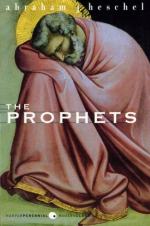
|
| Name: _________________________ | Period: ___________________ |
This test consists of 5 multiple choice questions, 5 short answer questions, and 10 short essay questions.
Multiple Choice Questions
1. In order to aid the reader's understanding, Heschel includes an appendix on what subject?
(a) Maps of the time.
(b) Pathos.
(c) Theology.
(d) God.
2. How long is the book of Habakkuk?
(a) 10 chapters.
(b) Longer than Jeremiah.
(c) Longest book of "The Prophets".
(d) A few chapters.
3. Heschel says God hates sin but is also what?
(a) Forgiving.
(b) Vengeful.
(c) Judgmental.
(d) Intolerant of injustice.
4. For what does Heschel say God wants his people to obey?
(a) Out of love.
(b) Out of fear.
(c) Out of obedience.
(d) Because they want to.
5. According to Heschel, what is one of the things that caused a need for prophets?
(a) Wars.
(b) People.
(c) History.
(d) Culture.
Short Answer Questions
1. "The Prophets" was written for which religious groups?
2. Micah lived about the same time as what other prophet?
3. Jeremiah says that even though people are punished they don't seem to what?
4. What was another name for Hosea?
5. According to Heschel, the land at the time of the prophets had judges and laws but they were both without what?
Short Essay Questions
1. Why was Jeremiah called the prophet of wrath?
2. What type of man was a prophet, according to Heschel?
3. Did the people listen to the prophet Isaiah?
4. Why does Heschel think Habakkuk is a tormented man?
5. In what way were Jeremiah and Micah the same?
6. Why does Jeremiah refer to the people of God as murderers?
7. What does Heschel say God's ultimate goal is?
8. How does God answer Habakkuk when he asks him why and how long this will continue?
9. What did Micah say in addition to warning the people about destruction due to their sins?
10. Does Heschel say there is anything that can change God's judgment after the prophets warn the people of destruction?
|
This section contains 520 words (approx. 2 pages at 300 words per page) |

|




